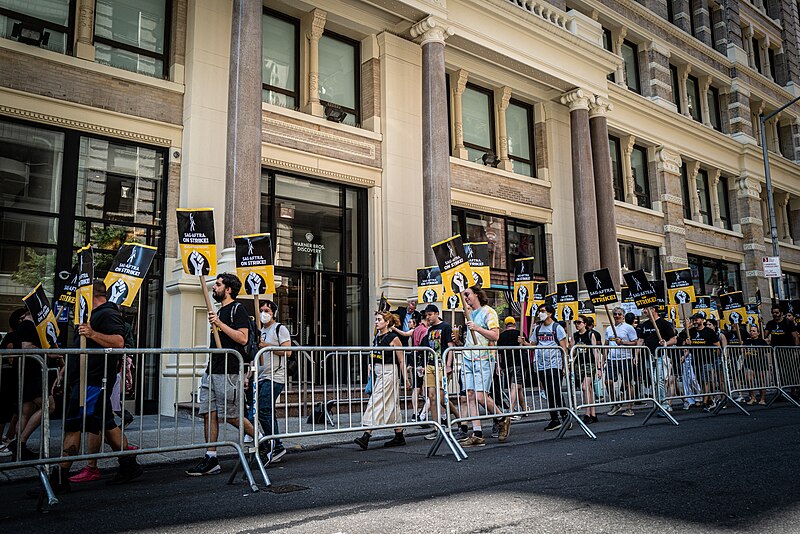
After a period of arduous negotiations and frustrated protesting, the Writers Guild of America (WGA) have successfully reached a tentative agreement to end strikes. At last, a sigh of relief can now be felt across Hollywood and the entertainment industry collectively.
The screenwriters’ strike, which began five months ago with union members voting ‘yes’ towards the action at a tremendous 97.85% majority, slowed production across film and television. Initially, it was the American late-night talk shows that were halted first, notable titles being the Tonight Show and SNL, followed by many streaming services’ most popular shows. The contract being agreed upon currently between the WGA and AMPTP (representative for over 350 US film and television production companies) promises to ensure fair compensation and secure workplace protections to writers under the union.
Now, with a positive outcome for screenwriters achieved, comes both reparative measures to the loss in industry and a shift of focus to the parallel SAG-AFTRA strikes which aim to provide better working contracts for actors. These strikes have garnered large amounts of public attention with stars swapping red carpets for picket lines. Last month, the stars of Oppenheimer – Cillian Murphy, Matt Damon, and Emily Blunt most notably – left the film premiere early to join the picket lines, causing a stir in entertainment media.
Now, with a positive outcome for screenwriters achieved, comes both reparative measures to the loss in industry and a shift of focus to the parallel SAG-AFTRA strikes which aim to provide better working contracts for actors.
Events hailed as the most important nights in Hollywood are seeming to pass by without notice, including most recently The Venice Film Festival, and TIFF (Toronto International Film Festival).
TIFF, whose legacy leans on news and social media coverage, occurred in September but fell under the radar of most mainstream media. Did the event simply lack public interest, or was there a conscious effort to turn a blind eye?
When questioned about concerns towards the future of TIFF, CEO Cameron Bailey confidently stated that ‘TIFF is on’ – yet the eyes of the media felt to be in fact switched off. Disappointingly, a lack of buzz fell over the festival due to the contractual absence of its bigger stars. Anna Kendrick skipped out on her directorial debut of Woman of the Hour, with a statement from the actress as “heartbroken to not be with you all in this moment”. A lack of stardom significantly impacted the media attention for this event, but this also gave spotlight to smaller up and coming projects – drawing attention to crew members other than the starring actors. When interviewed at Toronto, actress Jessica Chastain showed her support for all filmmaking crew members, demanding that the media “doesn’t just talk about the movie stars… its about people”. Chastain was praised for using her platform to shift media focus to an appreciation for working class staff: a sentiment felt consistently throughout TIFF.
When questioned about concerns towards the future of TIFF, CEO Cameron Bailey confidently stated that ‘TIFF is on’ – yet the eyes of the media felt to be in fact switched off.
Another festival that passed by underwhelmingly this summer was the Venice Film Festival, receiving slightly more public attention from more noteworthy presences with Wes Anderson receiving the ‘Cartier Glory to the Filmmaker’ award, and the debut of Sofia Coppola’s new biopic, Priscilla, earning a 7-minute standing ovation.
Not all filmmakers had the same success at Venice this year, however, as Luca Guadagnino’s Challengers was pulled from opening the festival, due to leading actress Zendaya’s association with the SAG-AFTRA strike action. The cancellation of the film’s debut has also affected its release, now being delayed until April 2024.
Whilst Zendaya was bound to a contract with SAG-AFTRA , both Jacob Elordi and Cailee Spaeny (stars of Priscilla) were given interim waivers to attend the event. This exception to the striking conditions owes to the film being created under independent studio A24, who have had multiple different projects greenlit for production by the SAG union. On top of this, SAG-AFTRA have approved production of 39 indie film projects this year throughout the striking period, keeping the genre afloat in times of chaos.
There now comes a hopefulness in witnessing space being given to indie filmmaking, and potential that the loss faced by these larger studio conglomerates, such as Paramount Pictures, Sony, and Warner Brothers, will force company executives into effective contracts similar to the triumph of the Writer’s Guild.


